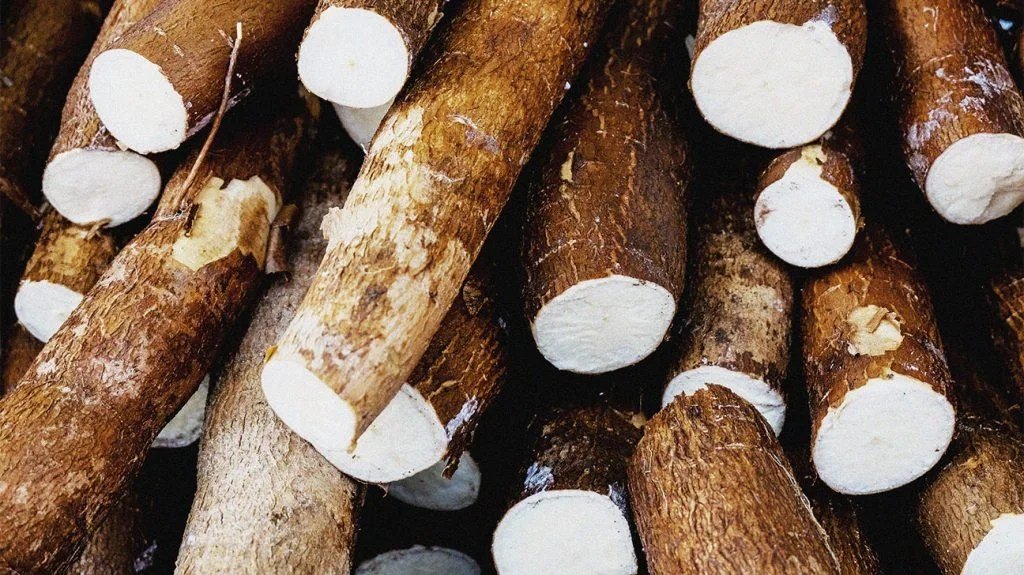Cassava, a tuber with no protein or gluten, is extremely helpful to the body and suitable for everyone, especially children.
Cassava is nutrient-dense and the third most carbohydrate-rich food in our environment, behind rice and maize.
Cassava, scientifically known as Manihot esculenta, is farmed and consumed in a variety of African and international countries.
Read Also: Why You Need To Start Eating Pineapple
According to Dr. Jules Kouassi, an Ivory Coast-based Doctor of Public Health and nutrition expert, cassava is a “God manna” since it can nourish everyone and be prepared in a variety of ways.
However, cassava should never be consumed uncooked since it contains harmful compounds. Proper preparation is necessary.
What nutrients can cassava provide?
According to Dr. Kouassi, cassava tubers are not only nutritious, but so are their leaves.
The tuber and leaves contain high levels of vitamins A, B, C, and E, as well as magnesium, mineral salts, iron, and calcium.
They’re also high in potassium, sodium, phosphorus, manganese, and zinc.
While it has no protein, it does include a significant amount of carbohydrates. “Cassava is about 70% carbohydrates, so it provides a lot of energy,” Dr. Kouassi says.
Cassava benefits both men and women by increasing fertility, according to Dr. Kouassi.
It also benefits the eyes, brain, blood, and skin when you consume cassava tubers or leaves.
It is very good for persons who do heavy labour and require a lot of energy.
Read Also: What Happens To Your Body When You Eat Beans
Cassava also combats anaemia and promotes excellent sleep: “This is why many people in our country feel sleepy after eating attiéké,” Dr. Kouassi explains.
Attiéké, a popular Ivory Coast dish, is made from cassava. Other cassava-based dishes include garri, loi loi or akpu, abacha, tapioca, and many more.
People from all over Africa like cassava-based foods. For example, Sandrine Tchoni of Douala, Cameroon, says, “I usually boil cassava tubers and eat them with okok.” Okok is a traditional Cameroonian meal prepared with leaves, palm nuts, groundnuts, and occasionally sugar.
It is very good for persons who do heavy labour and require a lot of energy.
Cassava also combats anaemia and promotes excellent sleep: “This is why many people in our country feel sleepy after eating attiéké,” Dr. Kouassi explains.
Attiéké, a popular Ivory Coast dish, is made from cassava. Other cassava-based dishes include garri, loi loi or akpu, abacha, tapioca, and many more.
People from all over Africa like cassava-based foods. For example, Sandrine Tchoni of Douala, Cameroon, says, “I usually boil cassava tubers and eat them with okok.” Okok is a traditional Cameroonian meal prepared with leaves, palm nuts, groundnuts, and occasionally sugar.
Cassava fights anaemia
Cassava leaves, according to Dr. Kouassi, can help treat anaemia, which is characterised by a lack of red blood cells.
He gave a precise prescription for utilising cassava leaves to treat anaemia: “Whether for adults, children, or the old, smash some cassava leaves. If you don’t have a blender, you can pound them and extract the juice. Then, add a little milk and consume one glass in the morning, midday, and evening. After three days, your red blood cells will improve.
However, because some cassava contains harmful cyanide toxicity, it is critical to fully roast it to remove the toxin.
“Yes, you must cook it well. Dr. Kouassi recommended that it be thoroughly cooked before pouring away the water.




